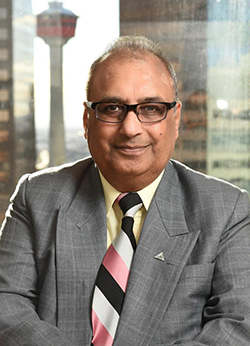Accreditation in Alberta: A Clear Path for Internationally Trained Professionals

 After Anil Gupta, P.Eng., wrote his final high school exam, he didn’t see his results posted online or even on his classroom door, because in 1960s India, that wasn’t possible.
After Anil Gupta, P.Eng., wrote his final high school exam, he didn’t see his results posted online or even on his classroom door, because in 1960s India, that wasn’t possible.
“Back then, there could be four to five million people taking the Class 12 exam, and there was no way they could tell everybody quickly, so they would publish it in the newspaper,” explains Gupta. Soon after reading his results, he started a five-year chemical engineering program at the Indian Institute of Technology (BHU), 500 kilometres from his home just outside Delhi.
By 1973, Gupta was a “gold medallist” graduate and even secured a job before he wrote his final college exams. He first worked in Delhi, then in Kuwait during the Iraq War. After a two-year stint in Japan, he flew to Fort McMurray in 1997, breaking ground on Suncor’s Project Millennium as his first job on Canadian soil.
Gupta has stayed in Alberta ever since, and in 2006, he joined APEGA’s Board of Examiners. He now serves as vice-chair of the Experience Committee, a part of the board that reviews applicants’ work experience.
“The Board of Examiners meets 11 times per year and takes a full day to discuss the cases,” Gupta says. “For some cases, we need more input, so we send those to the Full Experience Committee and meet with examiners with a background in those disciplines, then return with recommendations to the board.”
A Rigorous and Consistent Accreditation Process
The board aims for consistency with past decisions, starting with an assessment of the applicant’s engineering or geoscience experience. Applicants must have a minimum of four years of professional experience (per the Engineering and Geoscience Professions Act) and provide the names of licensed engineers or geoscientists who can validate their experience.
Over the past five years, Gupta says the board has shifted from an “objective to a quantitative model” by using a competency-based assessment of 22 required competencies that cover on-the-job experience, codes and standards, ethics, interpersonal-conflict resolution, and more. “Each competency is one page,” Gupta explains. “The applicant fills about half of the page explaining how they have demonstrated the competency, then their validator confirms whether they have done that work and if there were any deficiencies. Experience examiners then assess the submissions and make recommendations for a decision.”
Advice for Internationally Trained Professionals
Gupta advises internationally trained applicants to visit APEGA’s website for up-to-date requirements, to keep detailed experience records (with a supervising engineer’s or geoscientist’s validation), and to learn local standards. Most importantly, they can apply before moving to Alberta.
“While you spend time gaining the appropriate experience, you are allowed to work under the supervision of a licensed professional. This way, you don’t have to complete the application for the academic portion, fill out the experience portion, and work with your validators all at one time,” Gupta says.
The Value of a Professional Designation: A Mark of Trust and Expertise
APEGA’s independent examiners verify an applicant’s academics and their validator-approved experience, review any competency-based assessment feedback, and issue written recommendations. The result is a fair and trusted process that protects the public from unskilled practice and supports qualified professionals.
“Your culture makes a big difference,” Gupta notes. “In some countries, the culture is top down: If the boss says something, whether it’s right or wrong—it’s right. But Canada isn’t like that. Here, if the boss says something you believe is wrong, you share your opinion.” For Alberta engineers and geoscientists, it is important to speak up when an action poses a risk to public safety—even if it goes against the best interests of their employer.
According to Gupta, a professional engineer or professional geoscientist designation commands respect—both from the public and from companies that hire engineers and geoscientists. “Companies know this person is competent, qualified, and bound to a code of ethics, whether that company is in or out of Alberta. As someone who’s worked around the world and seen the process—or the lack of process in some places—APEGA and Alberta lead the way.”
